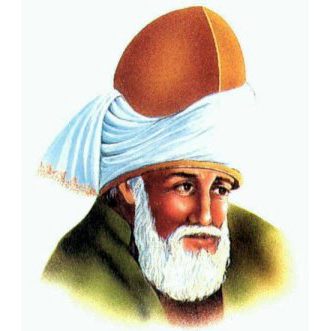Jalal ad-Din Rumi

Mowlānā Jalāloddin Balkhi, known in Persia as Jalāl ad-Dīn Muhammad Balkhī and in the West as Rumi, was born on September 30, 1207 C. E. in Balkh Province, Afghanistan, on the eastern edge of the Persian Empire. Rumi descended from a long line of Islamic jurists, theologians, and mystics, including his father, who was known by followers of Rumi as “Sultan of the Scholars.” When Rumi was still a young man, his father led their family more than 2,000 miles west to avoid the invasion of Genghis Khan’s armies. They settled in present-day Turkey, where Rumi lived and wrote most of his life.
As a teenager, Rumi was recognized as a great spirit by the poet and teacher Fariduddin Attar, who gave him a copy of his own Ilahinama (The Book of God). When his father died in 1231, Rumi became head of the madrasah, or spiritual learning community.
Rumi’s oldest son, Sultan Velad, managed to save 147 of Rumi’s intimate letters, which provide insights about the poet and how he lived. Rumi often involved himself in the lives of his community members, solving disputes and facilitating loans between nobles and students. The letters are described as having lines of poetry scattered throughout.
In 1244, Rumi met Shams Tabriz, who had taken a vow of poverty. Their meeting is considered a central event in Rumi’s life, and Rumi believed his real poetry began when he met Shams. They were close friends for about four years. Over the course of that time, Shams was repeatedly driven away by Rumi’s jealous disciples, including one of Rumi’s sons, Ala al-Din. In December of 1248, Shams again disappeared; it is believed that he was either driven away or killed. Rumi left the madrasah in search of his friend, traveling to Damascus and elsewhere. Eventually, Rumi made peace with his loss, returning to his home.
Rumi’s mourning for the loss of his friend led to the outpouring of more than 40,000 lyric verses, including odes, eulogies, quatrains, and other styles of Eastern-Islamic poetry. The resulting collection, Divan-e Shams-e Tabrizi or The Works of Shams Tabriz, is considered one of Rumi’s masterpieces and one of the greatest works of Persian literature.
You are not a drop in the ocean. You are the entire ocean in a drop.
Half of life is lost enchanting others.
The other half is lost in experiencing anxieties caused by others.
Leave this performance, you have played enough.
What was whispered to the rose to break it open… Last night was whispered to my heart.
Dance, when you’re broken open. Dance, if you’ve torn the bandage off. Dance in the middle of the fighting. Dance in your blood. Dance when you’re perfectly free.
Do you know what you are?
You are a manuscript of a divine letter.
You are a mirror reflecting a noble face.
This universe is not outside of you.
Look inside yourself;
everything that you want,
you are already that.
You were born with potential. You were born with goodness and trust. You were born with ideals and dreams. You were born with greatness. You were born with wings. You are not meant for crawling, so don’t. You have wings. Learn to use them and fly.
What a joy – to walk the road of the heart!
If you would have known the ecstasy of burning
You would not be able to live without heat.
And even if Waters of Life would spill around
They would not be able to remove you from the flame!
When you stop admiring yourself
Letting the eyes of the Heart turn
To the greatness of other worlds,
Then, no matter what you try doing, everything will be amazing!
The heart calms down from the words of truth how a thirsty one finds peace through water.
I was a seeker and still am.
But I stopped asking books and stars.
I began to listen to the teachings of my Soul.
Beyond the notions of right and wrong deeds, there is a field.
I will meet you there.
God gave you a polishing tool, Mind, so that the surface of the heart would sparkle.
